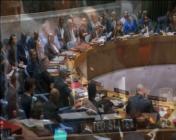POMPEO SAYS U.S. TO SUSPEND NUCLEAR TREATY WITH RUSSIA
Washington announces suspension of compliance with Intermediate-range Nuclear Forces (INF) Treaty with Russia, threatens total withdrawal if Russia does not end alleged violation of treaty.
BY REUTERS, JERUSALEM POST STAFF
FEBRUARY 1, 2019 16:07
3 minute read.

US Secretary of State Mike Pompeo delivers remarks on the Trump administration's Iran policy at the Heritage Foundation in Washington, US May 21, 2018.. (photo credit: JONATHAN ERNST / REUTERS)
WASHINGTON - The United States is suspending its compliance with the Intermediate-range Nuclear Forces (INF) Treaty with Russia on Saturday and will withdraw from the landmark 1987 arms control accord in six months if Moscow does not end its alleged violation of the pact, U.S. Secretary of State Mike Pompeo said on Friday.
Russia denies violating the treaty, which bans either side from stationing short- and intermediate-range, land-based missiles in Europe. and the INF Treaty strictly prohibits it, the officials said.
NATO allies "fully support" the United States' pending withdrawal notice from the INF nuclear missile pact over Russia's actions, a statement by the alliance said.
"The United States is taking this action in response to the significant risks to Euro-Atlantic security posed by Russia's covert testing, production, and fielding of 9M729 ground-launched cruise missile systems," it said.
"Allies fully support this action."
The United States alleges that a new Russian cruise missile violates the pact. The missile, the Novator 9M729, is known as the SSC-8 by the North Atlantic Treaty Organization (NATO).
Russia denies the allegation, saying the missile’s range puts it outside the treaty, and has accused the United States of inventing a false pretext to exit a treaty Washington wants to leave anyway so it can develop new missiles. Russia has also rejected a U.S. demand to destroy the new missile.
U.S. official said the U.S. action would be "reversible" if Russia came back into compliance during the six-month U.S. suspension. "Then the US would unsuspend," the official said.
The dispute is aggravating the worst U.S.-Russia frictions since the Cold War ended in 1991. Some experts believe the treaty's collapse could undermine other arms control agreements and speed an erosion of the global system designed to block the spread of nuclear arms.
U.S. Under Secretary of State for Arms Control and International Security Andrea Thompson on Thursday held last-ditch talks with Russian Deputy Foreign Minister Sergei Ryabkov in Beijing ahead of the expiration on Saturday of a US 60-day deadline for Moscow to return to compliance with the treaty.
Thompson and Ryabkov said afterwards that the two countries had failed to bridge their differences. They met on the sidelines of a meeting of the U.N. Security Council's five permanent members - the United States, Russia, China, France and Britain - all nuclear powers.
European officials are concerned about the treaty's possible collapse, fearful that Europe could again become an arena for nuclear-armed, intermediate-range missile buildups by the United States and Russia.
In an interview, Thompson said that suspension of US obligations would allow the U.S. military to immediately begin developing its own longer-range missiles if it chose to do so, raising the prospect they could be deployed in Europe.
Ryabkov said Moscow would continue working toward an agreement but accused Washington of ignoring Russian complaints about US missiles and of adopting what he called a destructive position.
"The United States imposed a 60-day period during which we had to fulfill their ultimatum," the Sputnik news agency quoted Ryabkov as saying after talks with Thompson. "I conclude that the United States was not expecting any decision and all this was a game made to cover their domestic decision to withdraw from the INF Treaty."
Daryl Kimball, executive director of the Arms Control Association, a Washington think tank, said he sees little chance the treaty can be saved.
"Neither side is showing the flexibility necessary to arrive with an agreement that brings Russia into compliance," he said. "So I think it’s highly unlikely that we will see an 11th hour diplomatic miracle. "Both sides at this point appear more interested in winning the blame game than taking the steps necessary to save the treaty," he added.
Join Jerusalem Post Premium Plus now for just $5 and upgrade your experience with an ads-free website and exclusive content. Click here>>










